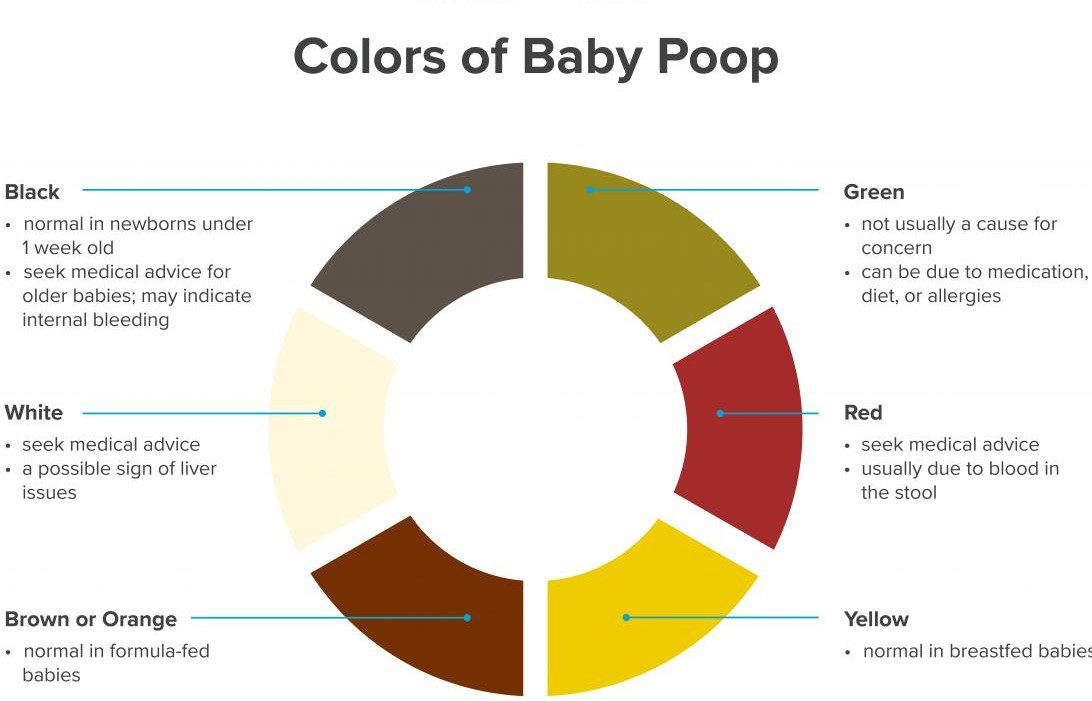During infancy, many newborns will have blood in their stool at least once. Blood streaks in a baby’s stool can be caused by straining to poop, tiny anal fissures, and other minor problems.
Bloody stool can also be caused by more serious conditions, such as intestinal hemorrhage. While caregivers should not be concerned, it is advisable to take the child to the doctor for a proper diagnosis and treatment.
Causes

It is not always the case that a newborn’s stool is red or black in color, indicating that the infant is passing blood.
Medication or diet
Red streaks or chunks in a baby’s stool can be caused by certain meals, such as tomatoes or beets, or food colorings. As a result, caregivers should pay particular attention to the baby’s recent food intake.
Dark or red stools are also a side effect of several drugs. Caregivers should think about if the infant has taken any drugs that could influence his or her stool.
A doctor can also assist identify whether the discolouration is caused by diet or medicine. In this instance, no therapies are required.
If the stool is stained with red or dark hues owing to blood, there are various probable explanations. The following are the most typical causes:
Breastmilk
Blood can sometimes be found in breastmilk. This happens a lot when someone is nursing and their nipples are cracked or injured. The infant may ingest some blood during a feed if this happens. This might result in faint blood streaks in the baby’s stool or a reddish-colored stool as a whole.
Blood swallowed by an infant while nursing is not harmful. If the person who is nursing has HIV or AIDS, they should talk to their doctor about the hazards of breastfeeding and blood in breastmilk.
People should address any injury to the nipple if blood is seen in breastmilk, because persistent nipple damage can impair breastfeeding and cause infections. Working with a lactation consultant to alter the latch and heal the afflicted region may be an option for the individual nursing.
Constipation
Some newborns have very difficult or large bowel movements, or they go for lengthy periods of time without having one. Constipated babies may strain to poop. Because the poop exiting the body generates microscopic rips in the anus, this might result in stools with streaks or specks of blood on the outside. This is referred to as an anal fissure by doctors.
Anal fissures usually heal on their own. They can, however, get infected in rare situations because they cause an open wound in a region with a lot of bacteria.
To relieve the discomfort, a doctor may prescribe an ointment or cream. To avoid constipation, a baby’s food may need to be changed.
Allergies and sensitivities to foods
Small streaks or specks of blood may appear in the stool of babies with food sensitivities or allergies, most often to cow’s milk. Within the first several weeks of life, this happened. If caretakers see blood-tinged feces on a regular basis, they should see a doctor.
Breastmilk or formula can cause allergic reactions in babies with allergies or sensitivities. A doctor may recommend a variety of tests to determine whether or not you have an allergy. They may also recommend dietary or formula adjustments for the nursing mother.
Diarrhea
A bacterial infection, such as salmonella or E. coli, can cause bloody diarrhea. While these conditions usually go away on their own, they can induce dehydration in newborns, which can be fatal. As a result, if a newborn has diarrhea, it is essential for caretakers to consult a doctor.
Fever, irritability, and feeding difficulties are some of the other indications of an infection.
Bloody diarrhea in newborns necessitates medical attention even if they have no other symptoms.
Upper gastrointestinal bleeding
Dark blood in the stool or black stools might indicate that the baby’s upper gastrointestinal system is bleeding, such as their stomach, esophagus, throat, or even nose.
This can develop as a result of a severe injury, such as choking. Upper GI bleeding can also develop as a result of a serious infection or illness.
Upper GI bleeding is a medical emergency, and the infant should be sent to the doctor as soon as possible.
Infections
Blood in the stool is a symptom of several illnesses. When a baby has an illness, they may get diarrhea.
Necrotizing enterocolitis is one of the most serious disorders. Preterm newborns and babies with significant health problems are more likely to get this illness. Caregivers may notice the baby’s stomach is enlarged or that he or she refuses to eat.
Necrotizing enterocolitis is a life-threatening condition. As a result, all babies who pass a bloody stool or have other risk indicators should be examined by a doctor.
Poop color chart
The graphic below explains what varied feces colors in newborns signify, including red or bloody stool. Blood may show in the stool as red streaks or dark flecks. It may also turn the entire stool a deep red color, or even black.

Treatment
Not all bloody stools require medical attention. Anal fissures and mild constipation usually go away on their own.
However, because newborns are more susceptible to some infections, a doctor would most likely try to figure out what’s wrong and treat it.
The best course of action is determined by the underlying reason. It might include the following:
- Pain treatment for anal fissures: A doctor may recommend sitz baths or creams.
- Surgery: A blockage in the intestines that causes bleeding could require surgery.
- Antibiotics: A doctor may prescribe antibiotics for certain infections or, rarely, to treat an infected fissure.
- Fluids: If a baby’s diarrhea causes dehydration, a doctor may prescribe intravenous (IV) fluids or electrolyte drinks.
- Diet changes: Constipation in older babies may be alleviated by eating more fiber. Younger babies may require a change in formula or extra breastmilk. It is sometimes necessary for a nursing mother to change her diet.
Conclusion
Blood in the stool of a newborn might suggest a temporary problem, such as constipation. It can, however, indicate a life-threatening medical disease like necrotizing enterocolitis.
Caregivers may find it difficult to detect the problem at home, so it’s essential to get expert help.
The majority of disorders that result in bloody stools are easily treated. Even if there is a major underlying problem, seeking medical help as soon as possible enhances the chances of a positive outcome and may even save the baby’s life.
Sources
- https://pedsinreview.aappublications.org/content/37/8/313
- https://www.medicalnewstoday.com/articles/blood-in-baby-stool
- https://www.thewellproject.org/hiv-information/can-i-breastfeed-while-living-hiv-overview-infant-feeding-options
- https://www.llli.org/breastfeeding-info/color-of-milk/
- https://www.ncbi.nlm.nih.gov/pmc/articles/PMC5360665/
- https://www.ncbi.nlm.nih.gov/pmc/articles/PMC5825861/
- https://www.nichd.nih.gov/health/topics/nec/conditioninfo/symptoms
- https://www.hopkinsmedicine.org/johns-hopkins-childrens-center/what-we-treat/specialties/gastroenterology-hepatology-nutrition/stool-color-overview.html







